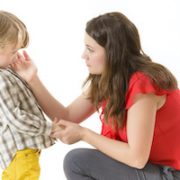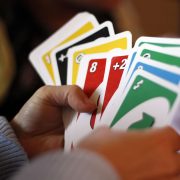Sticks and Stones My Ass– What to do When Your Kid Calls You Names, Part 3
Last week we learned that anger is always a secondary emotion. That means we can act as investigators rather than instructors when our children act out in anger. When our child/teen is angry, focusing on their other emotion and redirecting them to express this emotion effectively, will help dissipate their anger.
Usually, we fall into the power-struggle trap of commanding our children to behave: “don’t call me names, that’s disrespectful, go to your room!” This leaves our child/teen feeling powerful that they can hurt our feelings or make us react in anger.
Try these options instead:
Name the underlying feeling and comfort this part of your child.
Let’s use the example of Josie wanting a snack 10 minutes before dinner:
“You are sad that you don’t get a snack. Let’s get a drink of water to cool down those mad feelings.”
Redirect the emotion to an inanimate object:
“It’s hard when you don’t get what you want. That’s disappointing.”
“NO! You’re a bad mom!” (The first time doesn’t always work!)
“Josie, I know you’re disappointed you don’t get a snack right now. You can pretend the doll is me and call the doll names, but I am not for name-calling.”
Redirecting your child’s impulses toward an inanimate object is much like grumbling under our breath or in our heads for adults. Children don’t always have that level of self-control readily accessible when angry. Give them an outlet to maintain the verbal aggression without directing it at you. This is the first step to teaching them they can control their behavior.
Once your child follows through on this task, report their actions back to them:
“Ooh, you’re so mad you are calling her names!” This demonstrates to your child you are interested in understanding their feelings by naming them. They feel heard, and you are no longer the target of their anger. It is this part of the step that does not reinforce the aggression like people believe punching a pillow does for managing anger. When kids/teens feel heard, they feel less likely to act out.
Praise their efforts to calm down: “It was so hard to stop yelling at mommy, but you did it! You chose to yell at your doll instead.”
For teens, redirecting them to write down what they feel, or to play music to suit their mood is another good option, even if that means blasting the tunes. (“You can choose to write or draw about your disappointment, or play loud music to calm down. Please do not use that language when you are angry.”) Be sure to comment positively once they come back from their room on the effort it took for them to calm down. “You were really pissed, and you wanted to keep calling me names but you didn’t. I’m proud of you for that, that’s hard to do.”
Once your child/teen is calm, you can discuss with them how you feel when they use those words.
For teens especially, it could be very helpful for them to hear how those words bring up memories for you. Instead of in the moment via lecture-mode, here is the teachable moment. This is when you can come up with solutions to decrease the problem next time. Perhaps that means setting up a calm-down corner on the ground floor, or in their room. Notice how I said decrease, not eliminate when addressing the problem. Your child will yell again. They will call you names. Your responses will help eliminate the problem, their calm-down tools will help them feel more capable when upset.
I hope this is helpful. If you would like more tips about managing anger, or other child/teen emotions let me know in the comments!












Leave a Reply
Want to join the discussion?Feel free to contribute!